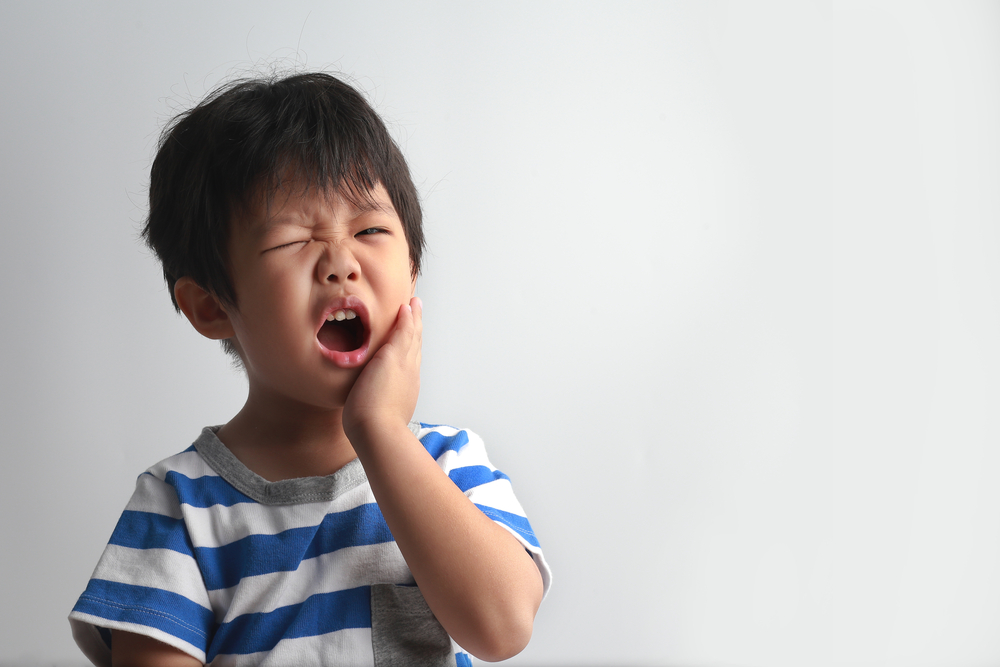 As a parent, it’s heartbreaking to see your child in pain. Whether a scraped knee, stubbed toe or, (heaven forbid!) a broken limb, you want to take the hurt away however you can.
As a parent, it’s heartbreaking to see your child in pain. Whether a scraped knee, stubbed toe or, (heaven forbid!) a broken limb, you want to take the hurt away however you can.
A child’s tooth pain falls squarely into the above. So what are the culprits that cause tooth pain in kids?
Dr. Paddy and Dr. Roger at Kids Mile High are here with the experience and expertise to answer that question! As your Denver area pediatric dentists in Englewood, Central Park and Thornton, we’ve seen many children with sore teeth and gums and have helped them through it. Parents often schedule an appointment with us when:
- Their baby has sore gums
- Their child’s loose tooth hurts
- Their child’s tooth hurts when eating
- They’re concerned about childhood teeth grinding
- Their child has sore jaws or teeth
A Baby with Sore Gums
When your baby is crying, irritable, drooling (more than usual!) and chewing on his fists, they’re probably teething and has very sore gums. Teething starts anytime from three months onward, with teeth starting to show around six months old. It’s an exciting ‘first’ for your baby but it can be a painful one. Just think, if adults experienced teething, “crying like a baby” would take on a whole new meaning!
Alleviating Teething Pain
The team at Kids Mile High Pediatric Dentistry has seen a lot of teething babies with swollen, tender gums and flushed cheeks. We know that it’s challenging for both the baby with sore gums and the parents. Here are our top tips for alleviating your baby’s sore gums:
- Counterpressure Using Teething Toys and Gum Massage – Your baby has the right idea when they’re chewing on their fist; they’re providing a relieving counterpressure. Give your baby with sore gums teething rings or plush teething toys — free of BPA, phthalates, latex and PVC, of course — and let them gum, gum, gum away! A wet washcloth is also comforting to chew. Even better? Try cold pressure: refrigerate teething toys and washcloths for further comfort.
A gum massage is a nice way to bond with your baby and apply that much-need counterpressure. You’ll also get the chance to feel for any newly-erupted teeth.
- Cold Food or Drinks: If your baby is already eating solid foods, give them cold items like yogurt or blended fruit. You could also try giving them refrigerated breastmilk.
- Distractions and Play: When the irritability cranks up, try changing your baby’s activity. Pull out a new book, go for a walk, play some happy music and sing along. Even short distractions help.
- Child Toothache Medicine: Baby pain relievers are an option, especially at night. Rest for your baby and you? Always important. Ask your pediatrician about infant ibuprofen or acetaminophen.
Baby Bottle Tooth Decay
While we’re talking about babies, let’s cover baby tooth decay. Yes, tooth decay can happen in those tiny teeth! Baby bottle tooth decay is what happens when babies are put to bed with a bottle of milk, formula or juice — anything that has sugars in it — and the sugars that sit in the baby’s mouth all night turn into bacteria and plaque. It can happen in the daytime, too. When you give your baby constant sips or bottles of sugar-containing liquids, you run the risk of bacteria building up.
Brushing and Flossing your Baby’s Teeth
To help get rid of bacteria in a baby’s mouth, use a soft, damp washcloth to gently clean your baby’s gums and teeth twice a day. Once teeth begin to show, use a soft, baby toothbrush with a tiny, rice grain-sized amount of toothpaste to gently brush teeth and gums. How often? At least twice a day. As for flossing, how many times a day should you floss your baby’s teeth? When teeth grow big enough that the gaps between start closing up, you should floss your baby’s teeth at least once a day.
My Child’s Loose Tooth Hurts
After the arrival of baby teeth, losing those teeth is the next step in a child’s dental development. Losing baby teeth to gain adult teeth happens during most of childhood, from 5-7 years old until about 12-13 years old. When your child says their loose baby tooth hurts, it’s most likely gum tenderness around the tooth. This is normal. For the most part, however, losing baby teeth doesn’t hurt, except for the back molars occasionally. Back molars don’t have baby counterparts to pave the way so they might cause your child tooth pain. During the day, cold or frozen food will soothe discomfort. At night, ibuprofen can help your child sleep better and lessen tooth pain.
In some cases, your child’s loose tooth hurts because of trauma to the tooth or gums. Are teeth or gums bleeding? Any teeth black or cracked? If so, make an appointment at Kids Mile High Pediatric Dentistry as soon as possible!
My Child’s Tooth Hurts When Eating
Tooth pain in children when they’re eating is not a normal event and needs close attention. When your child complains that his teeth hurt when eating, tooth decay is a likely culprit. Some causes include
- Cavities – Tooth decay, or cavities, can happen to anyone at any age. So if your child’s tooth hurts when eating, they could have a cavity. With a cavity, bacteria has worn away a tooth’s surface enamel, causing a permanent hole in the tooth. The lack of enamel makes a tooth more sensitive, and deeper cavities can expose nerves, which cause even greater pain. If your child’s pain is really bad, internal tooth decay is a possibility. Internal tooth decay is when tooth decay is happening within the tooth’s soft interior of nerves and tissue.
- Infections – With moderate cavities, only the teeth are affected. But with more severe internal tooth decay or gum disease, not only does your child’s tooth hurt when eating, but there might also be an infection in the gums. Infections also occur because of cracked teeth or abscesses. Signs of infected gums include: swollen and red gums, throbbing pain, a swollen jaw, fever or a bad taste in your child’s mouth. Eep!
If you suspect a cavity or infection is why your child’s tooth hurts when eating, make an appointment at our Englewood, Central Park or Thornton office right away.
Preventing Child Tooth Decay and Cavities
The best way to prevent and stop child tooth decay is a thorough brushing and flossing routine. Get your kids into good oral hygiene routines early so their healthy oral hygiene habits will carry into adulthood. Kids should brush their teeth at least twice a day for two minutes each time. Dentists suggest that parents brush their kids’ teeth as soon as the first tooth erupts and supervise kids’ teeth brushing until the age of 7 or 8.
People often ask, “How many times a day should you floss your kids’ teeth? Is it the same as brushing? More? Less?” When it comes to how many times a day you should floss your kids’ teeth, we typically recommend flossing your kids’ teeth at least once a day. Flossing is proven to significantly reduce the number of bad bacteria left in your mouth. Like brushing, parents should help their child with flossing, or at least closely supervise, until their child is about 7 or 8. After that, it’s still a good idea for parents to keep an eye on your kids’ flossing and brushing to ensure they’re doing a thorough job.
Tips for Encouraging Teeth Flossing
Find a flavor of dental floss that your kids like, use floss picks or a water flosser. If you make flossing fun, your kids’ answer to “How many times a day should you floss your kids’ teeth?” might be a surprising one like, “Every chance you get, mom!”
Kids’ Teeth Grinding
When your children go to bed, you wish them sweet dreams and a restful, peaceful sleep. What happens, though, if you hear the alarming sounds of your kids’ teeth grinding? Bruxism, as it’s officially called, affects 2-3 out of 10 children. It’s one of the more common kids’ oral health concerns we see at Kids Mile High and we’ve found that kids teeth grinding is most often related to misaligned teeth or stress. It can also be behind your child’s tooth pain.
- Misaligned Teeth – As we talked about earlier, losing baby teeth and gaining adult teeth happens continually from about ages 5 to 13. So there’s plenty of times during childhood when your kid’s teeth might not line up, resulting in discomfort and teeth grinding. The good news is that kids usually grow out of teeth grinding when all their adult teeth are in. If teeth grinding continues into the teen years, we suggest booking a visit with our Kids Mile High pediatric orthodontist Dr. Owens to assess if your child needs orthodontic care.
- Stress – An upcoming test at school, a piano recital or pivotal soccer game, an argument with parents or friends. Childhood stressors are a non-dental cause of kids’ teeth grinding. While we can’t eliminate your little one’s stress, if your child’s teeth grinding is damaging their teeth, Dr. Paddy and Dr. Roger can provide some guidance or suggestions — like outfitting your child with a custom-made mouthguard to protect their teeth.
Sometimes kids’ teeth grinding is a medical symptom. Certain medications can cause teeth grinding. Medical issues such as hyperactivity or being tongue-tied are linked to it, as well as conditions like cerebral palsy.
Sore Jaws or Teeth From Illness
Occasionally, your child’s tooth pain isn’t from any of the common dental problems in children that we’ve mentioned. Does your child have a stuffy nose? Is she complaining that her ears hurt? Sinusitis or an ear infection can cause jaw or teeth pain. In these cases, an over-the-counter pain reliever like ibuprofen or acetaminophen is an option, as long as it doesn’t interfere with any other medications your child is taking.
Dr. Paddy and Dr. Roger to the Rescue!
Now that you know what can cause child tooth pain, your next step is visiting us at Kids Mile High Pediatric Dentistry. As your Denver pediatric dental specialists in Englewood, Central Park, and Thornton, our fun, kid-centric vibe helps kids feel calm — even when they’ve got tooth pain. Dr. Paddy or Dr. Roger will quickly figure out the cause of your child’s tooth pain and provide guidance and solutions for a happy, pain-free child! Contact us today for an emergency virtual visit or an in-person appointment.



